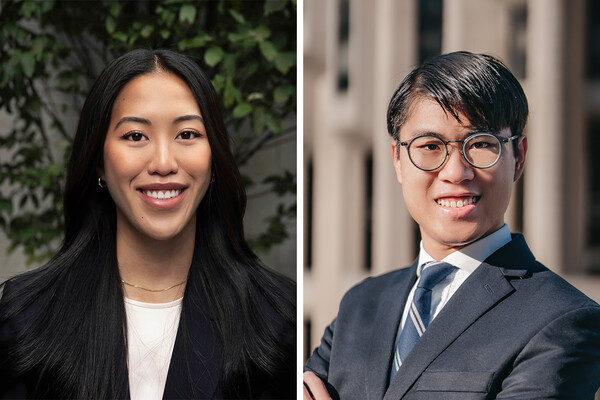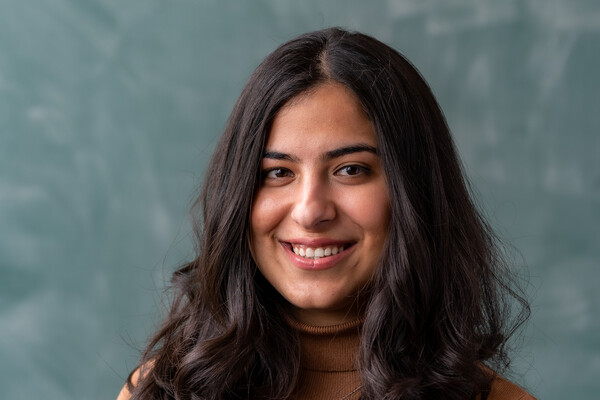Breadcrumbs
- Home
- MD/PhD Program
- News
- Faces of Temerty Medicine: Renee Bailey
Faces of Temerty Medicine: Renee Bailey
When Renee Bailey took to the stage during the Temerty Faculty of Medicine MD Program’s annual stethoscope ceremony at Convocation Hall this August, she wasn’t just marking an educational milestone — she was there to remind her peers to look to their pasts for insight into their futures.
In addition to her role as a second-year medical student and future physician, Bailey is a spoken word artist. She performed her original poem, “From Where Did You Come,” for her classmates at the ceremony.
Typically, the event welcomes new students into the MD Program, but this year it included second-year learners who didn’t have an in-person celebration in 2021. Recently, Bailey spoke with writer Erin Howe about her experience at the ceremony and the art of spoken word.
How long have you been doing spoken word poetry?
I’ve been doing spoken word for approximately five years. I stumbled upon it unexpectedly in the fourth year of my undergraduate degree at Ryerson University (now known as Toronto Metropolitan University) when I took a course that explored the historic and contemporary views around mental health.
I created a spoken word piece entitled “And I Continue to Run,” for the assignment. This piece highlighted how the act of Black slaves running away from their slave masters was viewed as a mental disorder and used to justify their control and containment. It draws comparison to the current incarceration and brutality of Black people as a containment to the freedom they continue to run for.
Since I wrote “And I Continue to Run,” it has garnered a lot of positive attention on social media and at events where I’ve performed it. But more importantly, it ignited a spark in me I never knew existed.
What was it like to share your work during the stethoscope ceremony?
Nerve wracking to say the least!
I love public speaking but there's something to be said about the normal jitters one feels before every presentation. As I began to recite the first few words on stage at Convocation Hall though, I felt like the strongest version of myself. I felt confident. No fear could have broken through the courage I had in that moment.
But what was most important to me that day was the impact my piece had on other people. After the ceremony, several people shared with me how powerful and encouraging my spoken word was to them — hearing this was a gift to me.
The truth is, we all need reminders of how far we’ve come in life. We’ve all had successes and triumphs, as we've had our shortcomings, adversities and disappointments. But the fact that we continue to move forward, is perhaps the greatest testament to our resilience.
What does this art form mean to you?
For as long as I can remember, I’ve been passionate about empowerment, health and racial equity, and social justice. Spoken word gives me the opportunity to speak up in a way that touches hearts and triggers reflection.
It also gives me a constructive and creative way to express my emotions on issues that deeply impact me and my community.
What draws you to the arts and is there a role for art in medicine?
As much as I love science, I’ve realized I also have a passion for the arts. The arts allow me to explore and express my emotional and creative side.
In high school, I developed a love for instrumental music and learned how to play the flute, saxophone and piccolo. During the early stages of the COVID-19 pandemic, I purchased and taught myself how to play the guitar — both acoustic and electric.
I believe that art lies in everyone and in everything. There is an art and a science to every body of knowledge, and medicine is no different. To me, medicine is about exploring the relationship between applied sciences and patient experiences, which can be challenging because experiences are unique to every person. Being able to find harmony in this relationship is where art exists.
What drove you to pursue medicine?
To help heal vulnerable groups, we need to understand who they are as people, and how their experiences shape not only their illnesses, but their healing processes.
I see medicine as a journey of healing and self-growth for me, as well as for the patients I will serve. At heart, I am an advocate.
I also chose to pursue medicine with the hope of becoming the example of a Black physician that I wish I’d had growing up. Representation is so important. Not only to people who long to see themselves in the doctors treating them, but also to young people who may have never seen medicine as a possibility for themselves because they’d never met a Black doctor.
I want to shift the trajectory for at least one racialized youth to see medicine as not only a possibility, but a reality for themselves.
News


